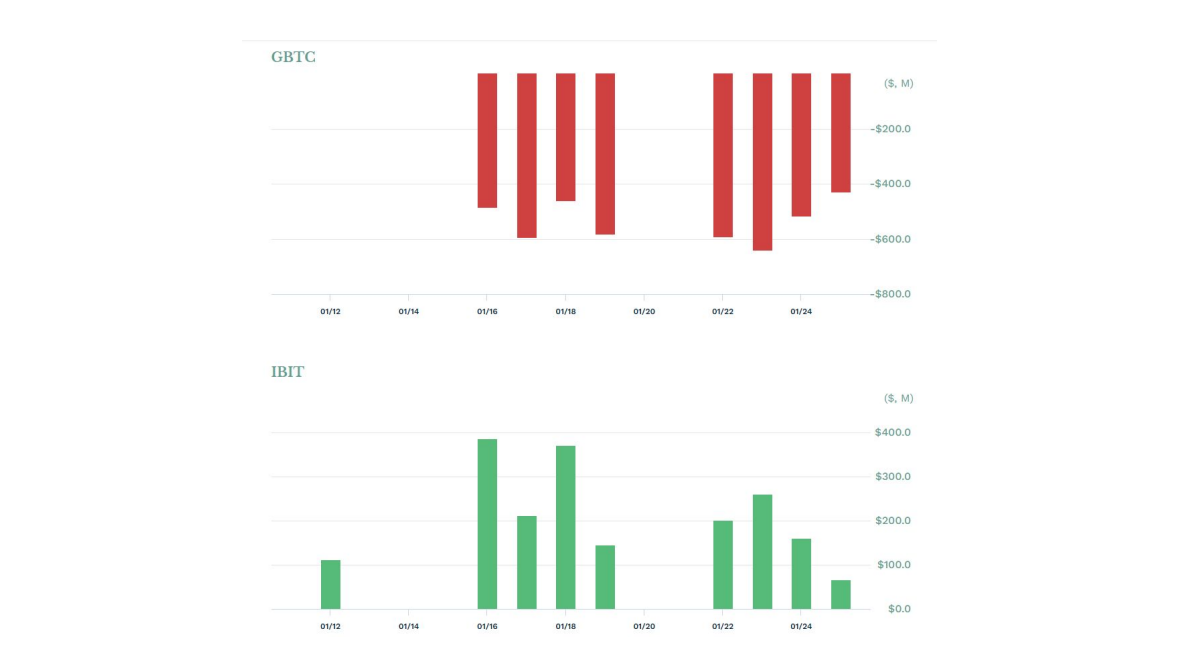In a recent market analysis by Bitfinex, significant attention is drawn to a substantial sell-off of Grayscale Bitcoin Trust exchange-traded fund (ETF) shares. This sell-off, partially driven by the financial troubles of the exchange FTX, appears to have played a crucial role in the notable drop in Bitcoin prices witnessed in January 2024.
Grayscale Bitcoin ETF witnesses a significant sell-off
The report, presented by Bitfinex’s head of derivatives, Jag Kooner, explores the repercussions of Grayscale’s successful conversion of its GBTC trust to an ETF and how it contributed to the broader market correction. The report suggests that the realization of profits following this conversion was a pivotal factor in the marketwide correction that saw Bitcoin’s value decline from $48,700 to $38,600 within a short span. One of the central elements emphasized in the report is the substantial “discount” offered to GBTC investors, which emerged as a primary driver for the elevated volume of share selling in recent weeks.
Kooner points out that during the bear market lows in late 2022, this discount exceeded 50%. However, due to arbitrage traders, this discount has now disappeared. Kooner underscores that the discount’s vanishing act was an anticipated outcome with the rollout of spot ETFs, and investors who had been patiently waiting seized the opportunity to realize profits. The report sheds light on the considerable outflows, totaling $4.3 billion, that followed GBTC’s conversion to a spot Bitcoin ETF on January 16. In contrast, BlackRock’s iShares Bitcoin Trust (IBIT) experienced the highest net inflows among individual spot Bitcoin ETFs, attracting $1.82 billion.
Free capital and shifting capital in the ETF space
Bitfinex analysts also point to the impact of ETF flows on the BTC price, noting that there was no flow of funds into the respective spot Bitcoin ETF on Saturday, January 20. Despite a drop from $28.6 billion before its conversion, Grayscale’s GBTC remains the largest Bitcoin ETF, with total assets under management hovering around the $24 billion mark. The report also notes that the conversion of Grayscale’s trust to a spot Bitcoin ETF facilitated the sale of significant shares held by the bankrupt cryptocurrency exchange FTX. FTX, facing financial difficulties, liquidated its entire holding of 22 million GBTC shares, valued at nearly $1 billion.
Another factor highlighted by Bitfinex Alpha is the impact of spot BTC ETF fees. Kooner points out that Grayscale’s competitors currently charge fees ranging from 0.2% to 0.9%, while Grayscale charges 1.5%. This difference in fees has incentivized investors to shift their funds from GBTC to lower-cost Bitcoin ETF options. Additionally, several other ETF filings have waived fees for the first year, further encouraging migration from GBTC to alternative products. Investors, seeking more cost-effective ways to gain exposure to Bitcoin, have significantly influenced the capital shift within the nascent Bitcoin ETF space.
As January concludes, ETF data suggests that the movement of capital between various ETF funds is beginning to stabilize. Kooner adds that while daily outflows are decreasing, they remain substantial at an average of around $450 million per day. Unless there is a change in the fee structure, outflows are expected to persist. The head of derivatives at Bitfinex concludes by highlighting that large GBTC investors who purchased shares at a 50% discount over the past two years would realize profits on an earlier timeline than other investors. This observation provides insight into the trading behavior observed in January.





